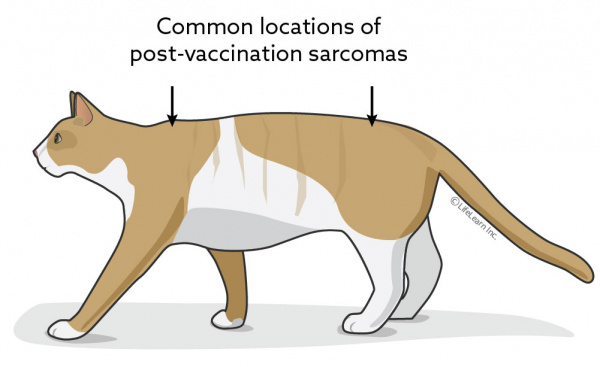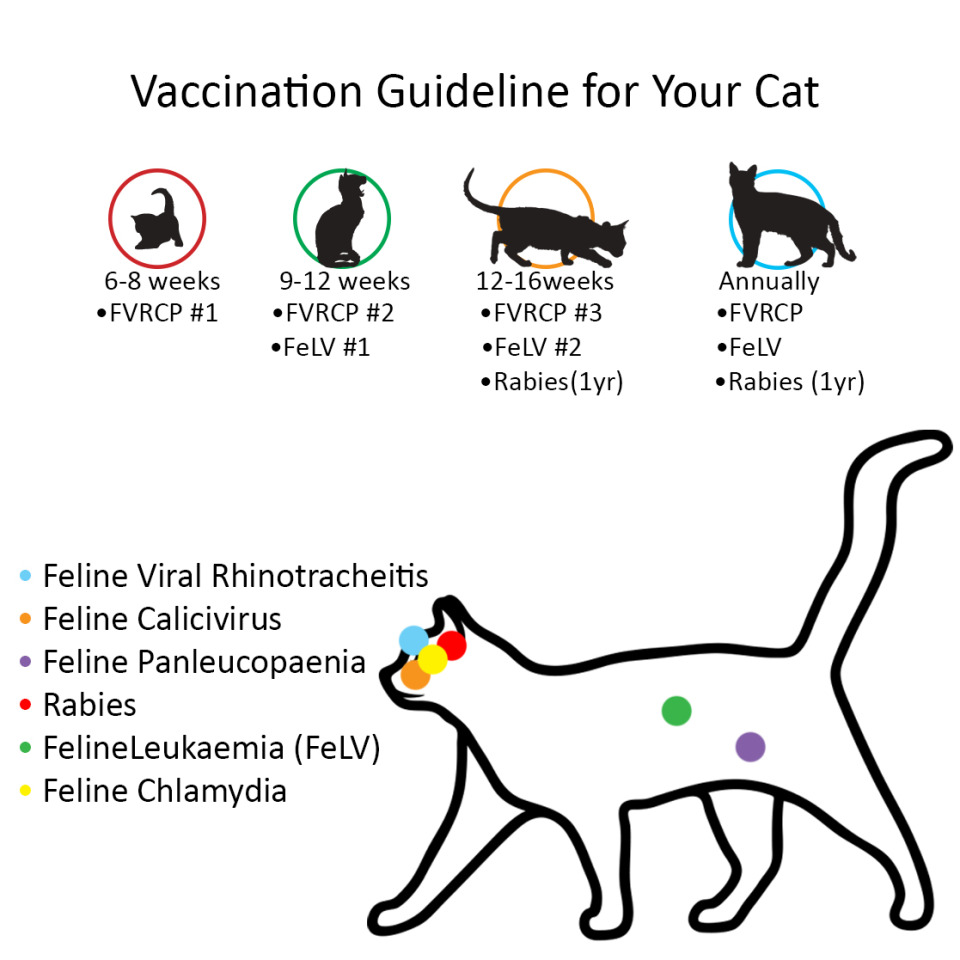Cat Vaccine Reaction Symptoms
If you suspect an allergic reaction to the. These allergies can be triggered by direct exposure to cats or by indirect exposure through fabric or air.

Post Vaccination Sarcoma In Cats Vca Animal Hospitals
However as with the two-dose or single-dose primary shots serious side effects are rare but can occur.

. Swelling anywhere on the body Breathing difficulty Cold ears legs and feet Seizures A pounding heart beat Collapse. A sarcoma is a term for any cancer of mesenchymal tissues. They usually appear within 1-2 days of vaccination and then disappear.
The development of fibrosarcoma at the injection site of a. Mild reactions can include a variety of symptoms such as mild fever lethargy poor appetite sneezing or respiratory problems slight discomfort at the injection site slight swelling at the injection site and vomiting. In the early stages the affected cat may suffer from lethargy and pain in the affected area.
When disease occurs it is a severe and often fatal gastroenteritis stomach and intestinal infection with profound depression dehydration and collapse see handout Feline Panleukopenia for more details. Other symptoms include vomiting diarrhea and itchiness. Feline respiratory virus infection FVR.
Can cause head and ear swelling vomiting hives collapsing shock and death. Vaccinating your cat. Fever headache fatigue and pain at the injection site were the most commonly reported side effects and overall most side effects were mild to moderate.
Systemic reactions include fever depression loss of appetite lethargy and weakness. Dermatologic conditions skin nose and footpad changes. Symptoms of a severe allergic reaction include.
Prompting the immune system to respond is the whole point of vaccination. Like vaccine-induced anaphylaxis the development of fibrosarcomas in response to vaccination in cats is rare estimated between 1 in 1000 and 1 in 10000 vaccinated cats10 Nonetheless if the cat affected is your patient or your pet that statistic is not particularly comforting. The vaccine called Cat-PAD uses peptide immunotherapy to target the immune system and train it not to overreact to the most.
Digestive tract abnormalities decreased appetite vomit diarrhea etc. Nasal discharge sneezing coughing or other respiratory symptoms which may occur up to 2 to 4 days after an intranasal vaccine vaccination with drops or sprays via the nostrils is administered. Some pets will have a little bit of soreness at the injection site.
Type 3 aka immune-complex. Type 1 aka acute anaphylaxis. Can cause anemia and thrombocytopenia.
Post-vaccination sarcomas usually involve the fibrous connective tissue under the skin and are often fibrosarcomas. A pilot study has shown that an experimental vaccine can reduce the systemic immune response and symptoms of allergic rhinitis in individuals allergic to cats including nasal congestion sneezing nasal itching and runny nose. This is because the immune system is working hard to make those antibodies and memory cells for the future.
Neurologic disease seizures tremors etc. Anyone who cares for his or her cat will want to protect it in this way and vaccination is a critical part of a proper preventive healthcare programme. Nervous system problems have been seen after vaccination with modified live rabies no longer available and canine distemper vaccines.
Some cats will develop a mild reaction that may last for a few days to a week after the vaccination. World Small Animal Veterinary Association World Congress Proceedings 2003. A vaccine is usually given by an injection.
FCV is thought to be associated with chronic gingivitis stomatitis a very painful inflammation of the gums and teeth. Organ system ailments kidney liver pancreas thyroid etc. Type 2 aka cytotoxic.
If the cat were bitten on the right rear leg the symptoms would exactly match those of. Local pain or soreness and lethargy for approximately 24 hours are very normal responses to vaccination. Much of this concern stems from the recent awareness of post-vaccinal complications that can result with currently available biologicals.
Decreased activity levels fatigue Loss of appetite. Reports of a tumor developing at the site of vaccine injection sites in some animals have led to the suspicion of a link between the vaccine and a disposition in some animals to this type of reaction. A cat allergy can cause symptoms such as red eyes and sneezing.
Rarely cats will have a more significant allergic reaction to the vaccine which generally happens within a few minutes to a few hours of receiving the vaccine. Compared to anaphylactic symptoms in dogs after rabies vaccination cats appear to be more prone to gastrointestinal and respiratory symptoms as post-vaccinated anaphylactic symptoms. Just as in humans vaccinating your cat helps to protect him or her against several serious andor life-threatening diseases.
Vaccination provides a high level of long lasting protection. Redness mild swelling and tenderness at the vaccination site. A little known and often misdiagnosed reaction to the rabies vaccine in dogs this problem may develop near or over the vaccine administration site and around the vaccine material that was injected or as a more widespread reaction.
Feline calicivirus encompasses a number of viral strains that cause signs of upper respiratory infection such as sneezing and nasal discharge as well as oral ulcerations. It is very contagious to other cats. Mesenchymal tissues include connective tissues such as skin and muscles bone cartilage peritoneum and blood vessels.
Behavior changes aggression unusual behaviors etc. In these cases cats may develop hives rednessswelling around the eyes and lips or a mild fever. Of the 316 severe adverse reactions after vaccination 130 cats showed anaphylaxis with 99 76 of the 130 cases resulting in death.
The most common vaccine reactions in dogs are lethargy and soreness which may or may not be combined with a mild fever. Can cause lesions and cloudy corneas. You may notice a cat allergy based on the timing of your symptoms.
Symptoms include ulcers scabs darkening of the skin lumps at the vaccine site and scarring with loss of hair. Veterinarians have become concerned with regard to over vaccinating and continual annual vaccination requirements for dogs and cats. This occurs because the dogs immune system reacts both locally and systemically to vaccine administration.

Cat Dog Vaccine Side Effects And What You Should Know Argyle Vet



No comments for "Cat Vaccine Reaction Symptoms"
Post a Comment